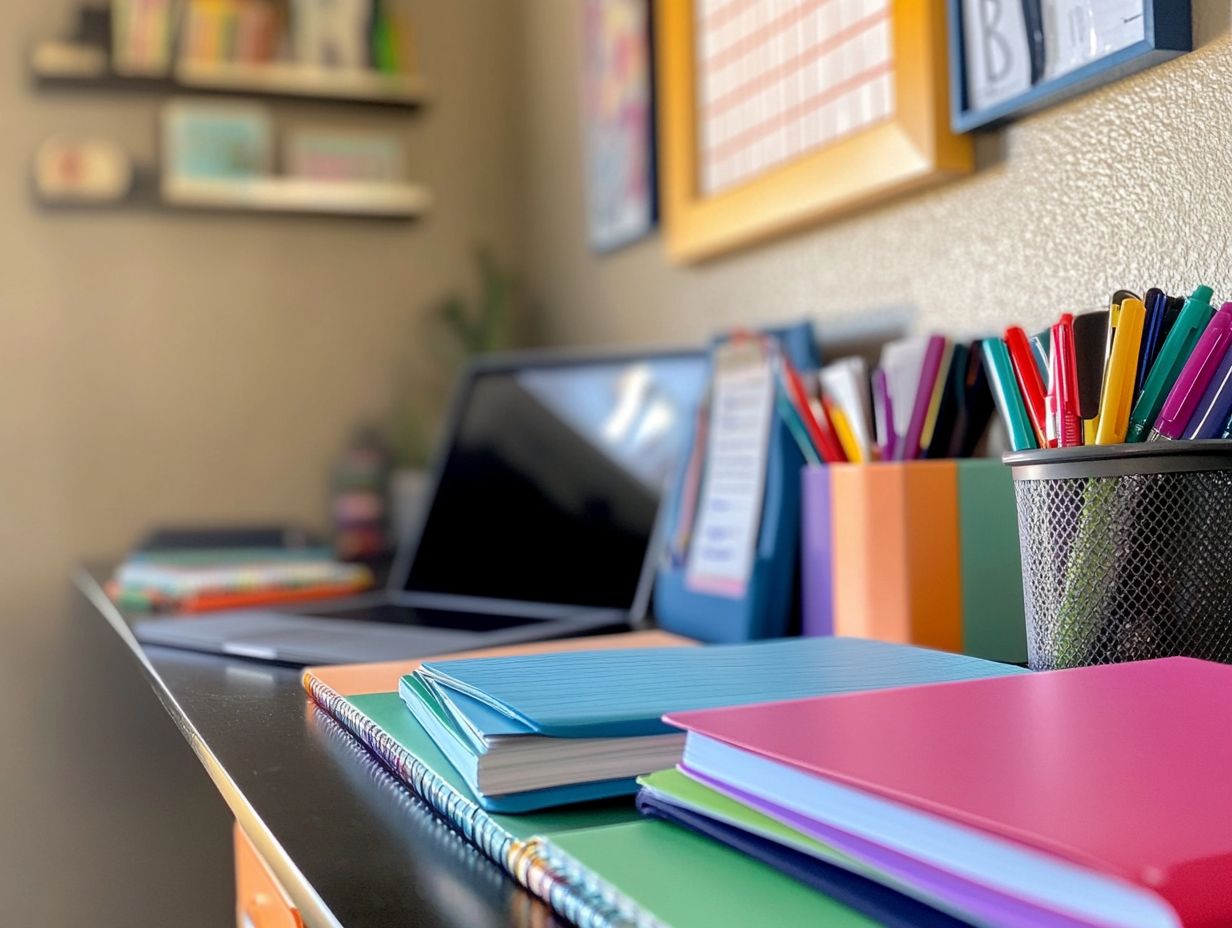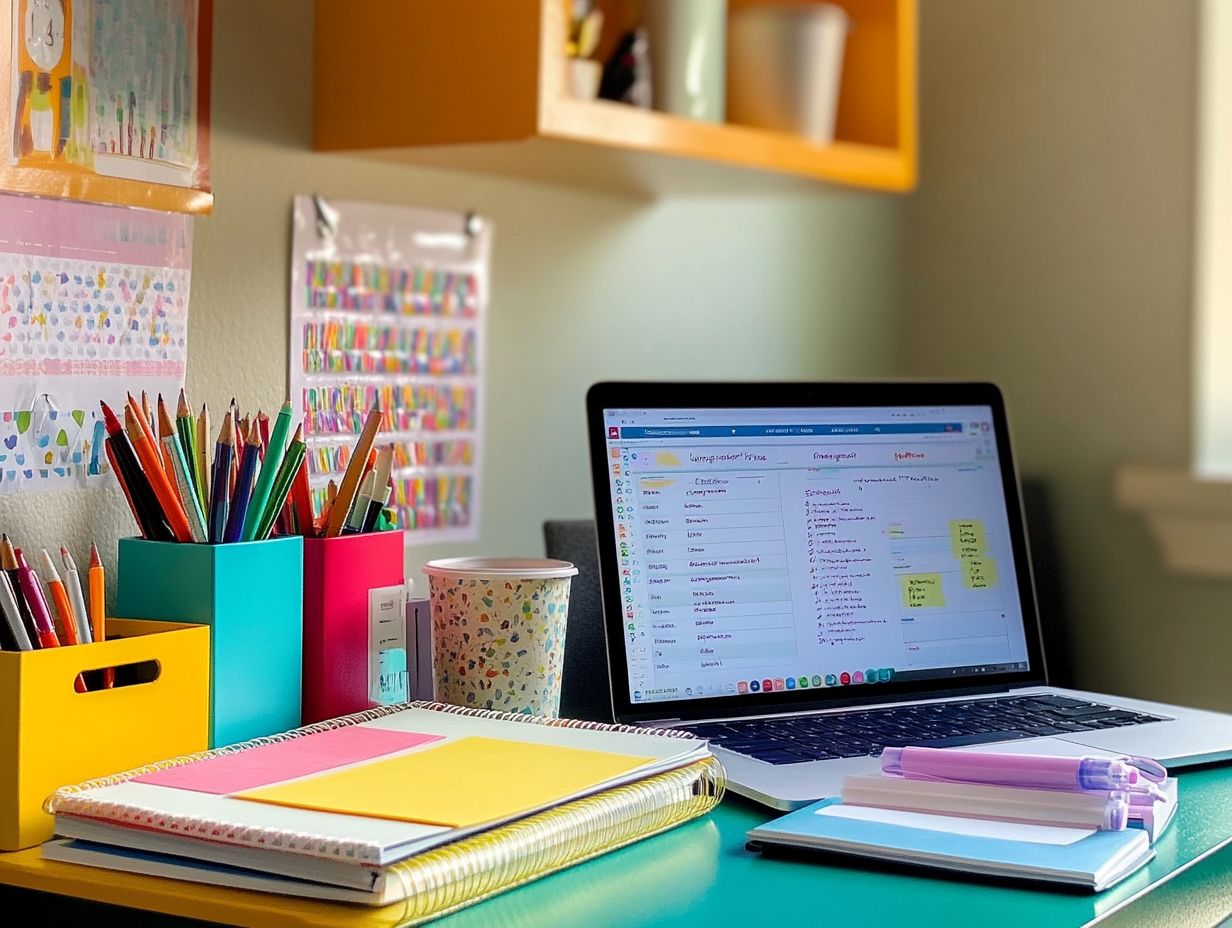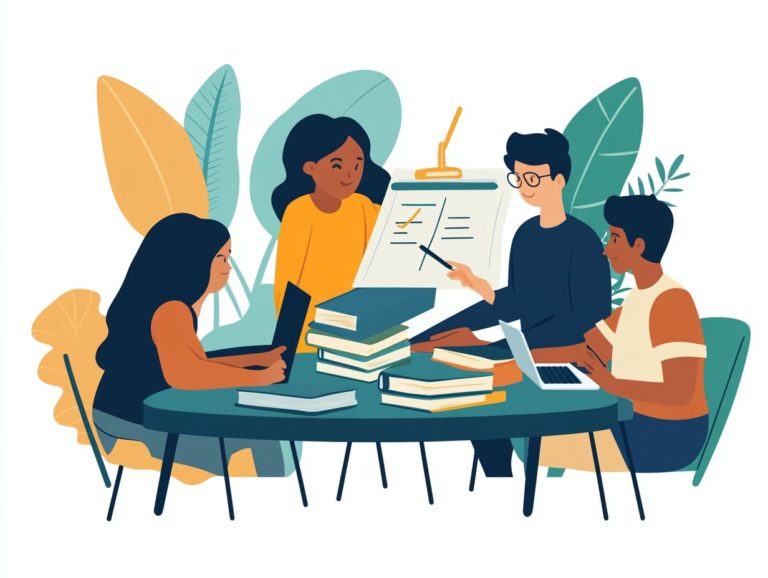organizing your study materials for success
In today’s fast-paced academic environment, effectively organizing your study materials can unlock your success.
This article explores the many benefits of staying organized. It will guide you in crafting a personalized study plan and managing both your physical and digital resources.
You ll discover practical steps to arrange your notes, textbooks, and online documents. Plus, you’ll find tips to maintain a tidy study space that fosters focus.
Explore valuable study aids and strategies designed for efficient review. Get ready to supercharge your study habits and enhance your academic experience!
Contents
- Key Takeaways:
- Why Organizing Your Study Materials is Important
- Creating a Study Plan
- Organizing Physical Study Materials
- Organizing Digital Study Materials
- Tips for Maintaining an Organized Study Space
- Utilizing Study Aids and Tools
- Incorporating Review and Revision into Your Study Plan
- Frequently Asked Questions
- What is the importance of organizing your study materials?
- How can I effectively organize my study materials?
- What tips help maintain an organized study space?
- How often should I review and update my study materials?
- How can I incorporate technology in organizing my study materials for success?
- What are some common mistakes to avoid when organizing study materials?
Key Takeaways:

- Staying organized boosts your academic performance.
- It enhances time management and reduces stress levels.
- Create a study plan by setting goals, prioritizing tasks, and scheduling study sessions.
- Keep your study materials organized by categorizing and labeling them.
- Regularly declutter your study space.
Why Organizing Your Study Materials is Important
Organizing your study materials is essential, whether you’re in high school or college. It plays an important role in shaping your study habits and your ability to engage with the content.
When your materials are well organized, your study skills improve. This leads to better academic success.
Conversely, disorganized materials introduce unnecessary stress, hinder information retention, and negatively affect your test preparation. This highlights the need for a structured approach to organization.
Benefits of Being Organized
Being organized offers numerous benefits for you as a student, particularly in improving information retention and creating an effective study environment.
When you adopt an organized approach to your studies, you streamline your learning process and use your time more effectively. This allows for focused study sessions that enhance understanding.
A well-managed study space whether a tidy desk or a structured digital workspace significantly reduces distractions.
With organization on your side, you can think about how you learn and adapt your study techniques. This leads to greater academic success because you can effectively track your progress and identify areas needing improvement.
Creating a Study Plan
Crafting a study plan is a crucial step for you as a student. It optimizes your study habits and paves the way to academic success.
This process involves setting clear goals, establishing realistic timelines, and using effective study techniques that match your unique learning style.
Steps to Develop a Study Plan
To create an effective study plan, follow these structured steps that prioritize time management and incorporate various learning strategies tailored to your needs:
- Identify your specific academic goals.
- Determine which subjects need more focus and evaluate your study materials. Assessing your resources ensures you have the right tools to succeed.
- Create a realistic schedule that allocates consistent time slots for studying while allowing breaks to enhance retention.
- Incorporate self-testing methods, like quizzes or flashcards, to encourage active recall essential for deep learning.
- Consider hiring an academic coach for valuable support. They can provide personalized guidance to help you stay on track and adapt your strategies.
Organizing Physical Study Materials

Organizing your physical study materials is vital for your success as a student. This approach ensures that your notes, textbooks, and handouts are not only easily accessible but also systematically arranged, allowing you to organize your study materials effectively and study efficiently.
Organizing Notes, Textbooks, and Handouts
Organizing your notes, textbooks, and handouts well is crucial for streamlining your study process. It enhances your information retention.
By adopting a systematic approach, you can locate important materials effortlessly. This saves precious time during exam prep.
One effective strategy is to categorize your notes by subjects or themes. Use color-coded folders or digital tagging systems to ensure all related information is grouped together.
Utilizing binders with labeled dividers provides quick access to various chapters and topics.
You can enhance your organized materials by using methods that involve actively engaging with your study materials, like self-quizzing or creating flashcards. These methods boost your understanding and retention.
When combined with well-structured resources, these strategies significantly contribute to your academic success. They allow you to engage deeply with the material.
Organizing Digital Study Materials
Organizing your digital study materials is a game-changer for your success!
The digital landscape offers powerful tools like Google Drive, Evernote, Quizlet, OneNote, and Trello that help you manage your study materials easily.
Managing Online Resources and Documents
Managing your online resources and documents is essential for leveraging digital organization for effective studying.
A well-structured digital workspace can dramatically boost your learning efficiency. By categorizing your materials into logical folders, you can retrieve critical documents easily.
Employing tags allows for quick access to frequently referenced materials. This lets you personalize your organization based on subjects or projects.
Regularly reviewing and decluttering your digital space ensures that outdated or irrelevant information is removed. This enhances your focus and reduces distractions.
Ultimately, these practices create a conducive learning environment. They enable you to thrive academically and master your subjects with newfound ease.
Tips for Maintaining an Organized Study Space
Maintaining an organized study space is crucial for effective studying and enhancing your overall productivity.
A well-structured environment influences your focus and time management abilities directly. This allows you to maximize your study sessions and achieve your academic goals.
Keeping Your Study Space Tidy and Functional

A tidy study space boosts your productivity and keeps you focused. Minimize distractions to maximize learning.
Incorporating productivity software can help you streamline tasks. Create to-do lists and manage your time efficiently.
By designating specific spots for each item from textbooks to stationery you cultivate a clutter-free space. This naturally supports better concentration and information retention.
This transforms the studying process into an enjoyable and effective experience.
Utilizing Study Aids and Tools
By effectively utilizing study aids and tools, you can elevate your learning experience. Transform your study sessions into engaging and productive endeavors.
Techniques such as flashcards and self-testing strategies make the process enjoyable. They also enhance your retention and understanding of the material.
Are you ready to start organizing your study materials today and watch your grades soar?
Effective Study Tools and Apps
Don’t miss out on tools that can transform your study habits and skyrocket your productivity! You have a wealth of effective study tools and apps at your fingertips, ready to help you manage your study sessions and boost your productivity. Think of platforms like Quizlet, Evernote, OneNote, and the Pomodoro Timer as your trusty allies in the pursuit of academic excellence.
Each of these tools comes packed with features tailored to suit different learning styles and preferences.
- Take Quizlet, for example; it gives you the power to create custom flashcards and interactive quizzes, making the process of memorizing key concepts engaging through repetition and active recall.
- Evernote and OneNote elevate your note-taking game, allowing you to organize your thoughts seamlessly, sync across devices, and incorporate multimedia elements that enrich your learning experience.
On the other hand, the Pomodoro Timer becomes your secret weapon for maintaining focus. By breaking your study sessions into manageable intervals, it promotes sustained attention while keeping burnout at bay.
Together, these tools equip you with effective strategies for enhanced organization and improved information retention.
Incorporating Review and Revision into Your Study Plan
Incorporating review and revision into your study plan is crucial for reinforcing your knowledge and ensuring long-term retention.
Using spaced repetition can significantly improve your studying.
Strategies for Reviewing and Revising Material
Implementing effective strategies for reviewing and revising your material is essential if you’re aiming to solidify your understanding and prepare thoroughly for exams.
By incorporating a variety of techniques, such as self-testing, you can actively engage with the content, which leads to a deeper level of comprehension.
Using flashcards can enhance your memory retention by promoting quick recall of key concepts.
Establishing a schedule for regular revisions not only allows you to break the material into manageable segments but also reinforces your learning over time.
These methods build strong study habits that boost your confidence and lead to success.
Frequently Asked Questions

What is the importance of organizing your study materials?
Organizing your study materials is important because it helps you stay on track, saves time, and reduces stress. With a well-organized study space and materials, you can focus better and be more productive in your studies.
How can I effectively organize my study materials?
Start by decluttering your study space and getting rid of any unnecessary items. Then, group similar materials together and create a designated space for each subject. Use color-coding, labels, and folders to keep everything organized.
What tips help maintain an organized study space?
Make it a habit to tidy up your study space at the end of each study session. Keep a schedule for cleaning and organizing your materials. Also, try to limit distractions such as using your phone or browsing the internet while studying.
How often should I review and update my study materials?
It is recommended to review and update your study materials at least once a week. This will help you stay on top of your studies and ensure that you have all the necessary materials for upcoming exams or assignments.
How can I incorporate technology in organizing my study materials for success?
There are many apps and online tools that can help you organize your study materials. You can use digital flashcards, note-taking apps, and even online planners to keep track of your study schedule and materials. Just make sure to back up your digital files regularly.
What are some common mistakes to avoid when organizing study materials?
Some common mistakes to avoid include procrastination, not having a designated study space, and not decluttering regularly. It is also important to not overcomplicate your organization system and to regularly review and update it as needed.






